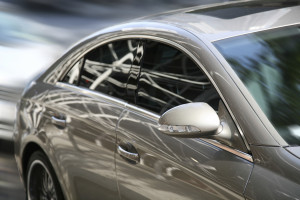Electric autonomous vehicles could shuttle passengers around the state with no one monitoring the controls under new legislation that would authorize and regulate the burgeoning technology, seeking to limit “zombie cars” and extract environmental benefits from innovation.
Sen. Jason Lewis, a Winchester Democrat who is filing the bill in the Senate, said its requirement that self-driving cars be zero-emission vehicles meshes well with the state’s goal to support electric vehicles.
“Since this is such whiz-bang technology already, requiring that they all be electric seems like a reasonable thing to ask,” said Lewis, who said the goal is to “move away from fossil-fuel vehicles and to zero-emission vehicles.”
Lewis described the legislation as a “framework” and said he welcomes new ideas and additional education around the issue, while acknowledging that passing his bill into law this session could pose a “challenge.”
“I’m hopeful there will be a robust debate on this issue,” Lewis said in an interview.
The bill would include a baseline 2.5-cent per-mile fee, intended to offset foregone gas tax revenues, that could be lowered based on unavailability of public transit options or increased for certain trips taken during peak hours, according to Lewis.
Lewis said the bill seeks to limit “zombie cars” – cars without any passenger that might drive around to avoid parking fees or because parking is unavailable. “If you have a world like that you could actually increase congestion,” Lewis said.
The bill states that if the Registrar of Motor Vehicles permits autonomous vehicles to be tested or deployed on public streets without a passenger present, only freight and emergency vehicles would be allowed to travel more than one mile continuously without anyone in the vehicle.
In a speech to his colleagues at the start of the session, Senate President Stan Rosenberg described self-driving cars as an unavoidable future development, and later likened the pace of disruptive innovation in automotive automation to that of the smartphone, which revolutionized how people consume information and communicate with one another.
Without statutes explicitly authorizing or banning self-driving cars, Boston has allowed for experimentation of the technology in the Seaport area, and the state has convened a working group, which is scheduled to meet on Feb. 1.
While registering whether the car is nearby public transit options and calculating mileage, the vehicle-miles-traveled technology would include privacy protections so that it could not be used to pinpoint someone’s travels, according to Lewis and Conservation Law Foundation Vice President Rafael Mares.
The Massachusetts Department of Transportation ventured into new privacy-protection terrain late last year when it converted its tolling system into an all-electronic model that uses cameras and other technology to log vehicles traveling on the Massachusetts Turnpike purely for billing purposes. MassDOT, which would play a major role in regulating self-driving cars under the bill, declined comment on the legislation.
Lewis said the Conservation Law Foundation and Transportation for Massachusetts, two advocacy organizations that support better public transit, worked on the legislation. Rep. Tricia Farley-Bouvier, a Pittsfield Democrat, sponsored an identical bill in the House.
“It would be a nation-leading bill,” said Mares, who said it has important protections for safety and environmental impacts. “It is really an important time to be proactive because the technology’s advanced so much.”
Mares pointed out that if the state moves towards electric autonomous vehicles, state coffers could lose out on gas tax revenue as well as revenue from speeding tickets.
The legislation contemplates two forms of futuristic vehicles: an autonomous vehicle, which is purely self-driving and a “level three vehicle,” which is an autonomous vehicle that operates with the “expectation that a human driver will be available to respond appropriately to a request to intervene.”
The per-mile fee would be set by MassDOT starting at 2.5 cents, with allowances for lesser fees on publicly owned vehicles, vehicles with multiple passengers, travel during off-peak hours, travel in places lacking public transit options, and operators with income below a certain threshold. Under the bill the fee could be increased for each mile traveled without a passenger, on vehicles weighing 4,000 pounds or more, and for daytime travel within a “severe congestion zone.”






